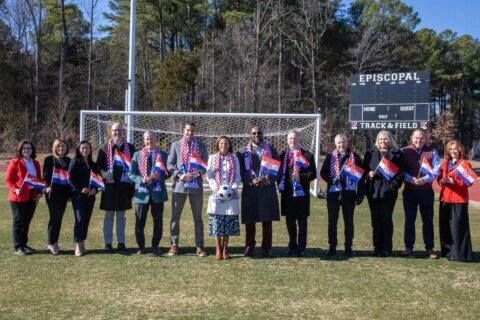The advisory group formed to determine the future of School Resource Officers in Alexandria, Virginia, city schools has concluded SROs should remain in the school system.
The School Law Enforcement Partnership, made up of community members, the Alexandria Police Department, city representatives, public school students and staff, will present its recommendations to the school board on Thursday.
The overarching recommendation is that the school board work with city council to continue SRO funding.
“SROs are part of a holistic program, and will not independently solve safety concerns but they belong in the mix, and will require continued funding at either current or elevated levels,” according to the report.
“Removing SROs would send a message to many families and community members that ACPS does not take seriously the violence that has occurred at regular intervals in the last year.”
In the past several years, most school systems in Northern Virginia have re-evaluated the roles of SROs, who are generally employees of local police departments and sheriff’s offices. Reconsidering law enforcement officers in school environments have coincided with the nationwide study of systemic racism and policing, that became more urgent after the 2020 killing of George Floyd, a Black man, in Minneapolis.
SROs have become a political hot-button issue. In August 2022, Virginia Attorney General Jason Miyares urged the city’s mayor and school system to “draw a hard line against crime,” and take advantage of state funding for police officers in schools.
In a statement, a Miyares spokeswoman said, “SROs play an important role in supporting the physical safety and wellbeing of Virginia’s students. The Attorney General supports SROs serving as a method of preemptive frontline protection and appreciates the advisory group’s work to further prioritize student safety.”
The School Law Enforcement Partnership said it’s aligned with the school system’s strategic plan, which it calls “Equity For All,” listing core values as “Welcoming, Equity-Focused, Empowering, Results-Driven, Innovative.”
The advocacy group suggested conducting an independent study, with a new committee comprised of professionals who aren’t employed by the Alexandria police department or school system, “to explore why minority students are arrested at higher rates.”
One of the recommendations was making de-escalation part of the yearly professional development training for school resource officers. In addition, “SROs should report when de-escalation has been used and whether its use during a contact successfully resulted in an alternative to arrest or reduction in a student’s emotional state.”
Another recommendation includes setting a policy that will allow prompt incident reporting to parents.
“Be clear about potential delays or legal constraints on what can be revealed, but commit to being as forthright as possible,” the group stated.
The advocacy suggested researching alternative education programs, including short-term learning environments for students who are awaiting hearings, while keeping them on track for graduation.







